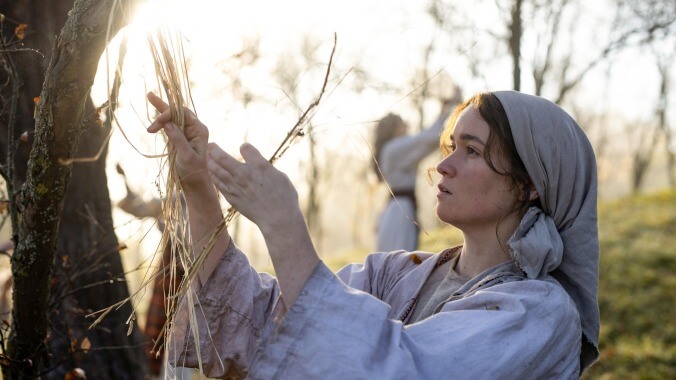You Won’t Be Alone asks women, which witch are you?
In Goran Stolevski’s feature debut, generational hatred and empathetic feminism fuel this mix of Malick and the malicious

You Won’t Be Alone begins with a cat walking offscreen, audibly seeming to meet a terrible fate, then walking back onscreen as if nothing happened. From there, the camera takes a cat’s point of view, stalking into a medieval-ish village where a baby is crying. Things don’t necessarily go well for the infant, either, because the cat is not what it seems—and the baby’s going to need its mother’s wits to escape a dire situation.
Suffice it to say that if jeopardy for furry animals and children isn’t your thing, steer clear of this one. But gore fans should also be cautioned that this isn’t a movie about mutilations either. It’s a reclamation of fairy tales, and a feminist take on witchcraft fears, shot in the style of Terrence Malick—well, if he were both Macedonian and part of the New French Extremity horror movement that gave us the likes of Inside and Martyrs.
The stereotype of Malick, at least in perception, is that any movie with fields-of-wheat shots belongs to him. And indeed, You Won’t Be Alone has those. But it also uses voiceover faux-poetry (fauxetry?) as its primary means of exposition. Internal monologues, translated via subtitles into an odd sort of slang representing an older Macedonian dialect, drive the tale of our protagonist Nevena (Sara Klimoska, initially, then a variety of actresses and actors including Alice Englert, Carloto Cotta, and Noomi Rapace), the baby from that opening scene. Raised alone in a sacred cave to evade a promise made under duress to a witch, Nevena eventually finds herself claimed by the supernatural crone anyway and granted shape-shifting powers.
Those powers essentially allow Nevena and her newly “adopted” witch mother, a now-mythical figure known as Old Maid Maria (4 Months, 3 Weeks And 2 Days breakout star Anamaria Marinca), to replace any person or animal, reducing their victims to a semi-obliterated stain on the landscape. But while the disfigured Maria mostly holds contempt for humanity, the isolated Nevena wants to know more about it. Consequently, she enters several lives over the course of the movie much to Maria’s disgust, instigating a conflict that escalates to much more than a difference in generational perspectives.
First-time feature director Goran Stolevski puts a lot of trust in his audience, eschewing easy exposition to portray a world where the characters need no explanation of events. When a woman first recognizes Old Maid Maria, for instance, nobody spells out for the audience what her significance is; her presence alone and the reaction to it says everything. Much later, we do learn more in a situation where such knowledge would naturally come to the surface.
But keeping up the plot quickly becomes an irrelevant consideration because it mostly serves as a means to extract deeper themes. By embracing her humanity in a drastically different era than the one which cursed her mentor, Nevena benefits from social change in a way Maria either cannot or will not. By becoming both men and women, Nevena experiences sex from both sides, with the attendant risks and pleasures unique to different genders. And by shifting into people of different ages, she gets to live all the growing up she never got as a human child.
There’s a lesson here about empathy and the social environment—it’s better, of course, to seek understanding, but is that perspective a privilege held by those who never experienced violence or hatred? Stolevski highlights why forgiveness and reconciliation is often a responsibility foisted upon the next generation; while it’s perhaps obviously easier to forgive someone who didn’t try to burn you alive, even if they did it to someone else, Nevena explores the world with a cleaner slate than her “mother,” at least for a while. It’s also through this dynamic that he examines the reverse of that perspective as children learn to forgive their parents, be it for the behaviors implanted in their young bodies or for beliefs they attempt to pass on. That’s a lot to put on a kid, but it’s something that must be explored before they become parents themselves and extend a potentially unhealthy, even dangerous cycle.
While again You Won’t Be Alone isn’t a movie whose purpose is to languish in gore, slow cinematic meditations like this don’t usually feature quite so many disembowelments, even if people do love to use metaphors about their guts being ripped out to describe emotionally fraught situations. So why not literalize it? As the film’s title suggests, even when one’s life is entirely different from that of everyone around them, there’s a universality of emotions that binds them—and the audience—nonetheless, especially when its story literally manifests the notion of walking in another person’s shoes.
Stolevski ably balances art-house and horror tones to a degree that fans of both will appreciate, but like the film’s pointedly empathetic point of view, his emphasis on each helps fans of one style understand and appreciate the other. You Won’t Be Alone announces the arrival of an intriguing new talent in horror, and as his chameleonic protagonist walks between multiple worlds, it will be interesting to how successfully he does the same.